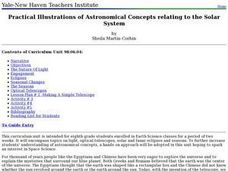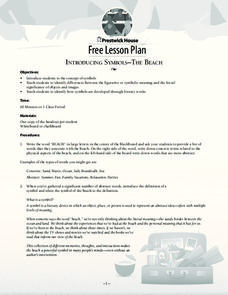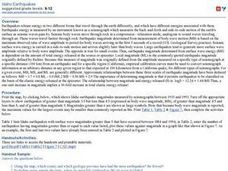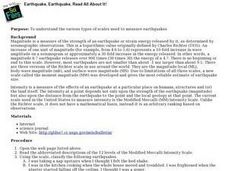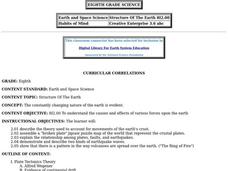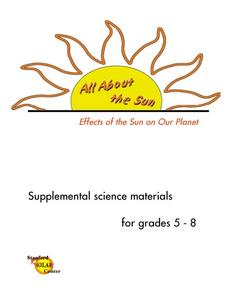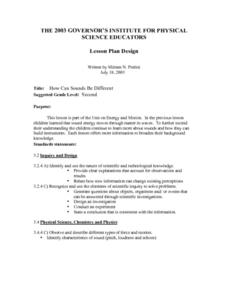Curated OER
Practical Illustrations of Astronomical Concepts Relating to the Solar System
Eighth graders are introduced to concepts related to the Solar System. In groups, they participate in an experiment in which they must describe a ray of light and how it travels. They draw a diagram of the electromagnetic spectrum and...
Curated OER
Drama: Working Together
Young scholars participate in a host of activities designed to encourage creativity, collaboration, and cooperation. They experience walking in different ways, greeting various types of people, and mirroring, where one student duplicates...
Curated OER
The Virtual Electron Microscope
Students explore the world of the very small using a Flash plug-in Virtual Electron Microscope. They complete and discuss an activity in which unknown samples are placed under the computer simulated microscope to determine where the...
Curated OER
Communicating Data
In this data worksheet, students match information with the best type of graph to display it. Students also make a chart and graph to display information in a given paragraph.
Curated OER
Ocean World
In this components of the ocean worksheet, students answer 20 questions about various species in the ocean such as plankton, different types of whales, sharks, and herring. Students also answer questions about the volume of water in the...
Curated OER
English Exercises: Mysteries of Anatomy
Consider this online interactive activity as a way to practice the names that often accompany human anatomy, such as the crown of the head and the roof of the mouth. Learners select an anatomy word with a double meaning from a drop-down...
Curated OER
What is a Haiku? How Do You Write a Haiku?
Haiku poetry is explored in this language arts lesson. Yong readers identify the characteristics of haiku and read several examples. Students make connections between their study of Japan and the poetic form of haiku, and they write...
Colorado State University
What's the Difference Between Blue Light and Red Light?
Finally, an electromagnetic spectrum lab that will get glowing reviews from your class! Explore the nature of light using red and blue LED sources and fantastic phosphorescent paper. Young scientists compare the effects of blue light...
Prestwick House
Introducing Symbols–The Beach
Looking for a way to introduce class members to the concept of symbolism and multiple levels of meaning? Readers examine two different passages about the beach and consider how the writers use concrete objects, and places to...
Curated OER
Plate Tectonics: Fourth Grade Lesson Plans and Activities
The pre-lab portion of the lesson introduces emerging geologists to the various layers that make up Earth. After completing a sheet on the identification of the layers, class members simulate plate boundaries and their...
Curated OER
The Old Man and the Sea: Guided Imagery
What do you imagine when you think of the sea? Put on some ocean sounds, close your eyes, and listen to a guided meditation based on the imagery from The Old Man and the Sea by Ernest Hemingway. After class members listen to...
NOAA
Make an Edible Coral Reef
Coral reefs are full of an abundance of life and color. Why not celebrate it with an edible coral reef? Learners and teachers alike use cake, icing, and candies to create a tasty version of a coral reef that's complete with colors,...
Curated OER
Radio
Students explain in their own words how radios work. In this technology lesson, students discuss the importance of radio today. They differentiate AM and FM bands.
Curated OER
Name That Tune: Matching Musical Tones Through Waveform Analysis
Pupils detect the waveform of musical notes to determine the code for the "safe" in this forensics simulation lesson plan. They use a microphone and tuning forks along with Vernier EasyData on their graphing calculator to analyze five...
Curated OER
At the Beach
In this punctuation worksheet, students read the sentences and add a period, exclamation point, or a question mark to the end of each sentence. Students complete 10 sentences.
Curated OER
Sounds Like Science - Bottle Organ
Students see that by manipulating sound we can arrange a series of notes referred to as a musical scale. They explain the relationship between pitches and notes. They compare the sounds of different-sized bottles.
Curated OER
Properties of Light
In this light spectrum worksheet, students will read a diagram and a chart listing information about the different types of light rays from Gamma rays to radio waves. Then students will write a short essay about a new life-form that...
Curated OER
Idaho Earthquakes
Students examine the types of earthquakes that occur in Idaho. In groups, they compare and contrast the types of energy released and how they affect the movement of the Earth. To end the lesson, they analyze a map showing the magnitudes...
Curated OER
Earthquake, Earthquake, Read All About It!
Students utilize the U.S. Geological Service web site. They research the various types of scales used to measure earthquakes and classify different situations on the scale. They write a story about a town that has just experienced a quake.
Curated OER
Structure of the Earth
Eighth graders examine the forces that are constantly acting on the Earth. They describe the theory of tectonic plates and demonstrate the two kinds of earthquake waves. They also examine the role of volcanoes in the structure of the...
Curated OER
Tune...Um!
Learners collect real data on sound. In this algebra lesson, students use a CBL and graphing calculator to observe the graph created by sound waves. They draw conclusion about the frequency of sound from the graph.
Curated OER
Effects of the Sun on Our Planet
Students examine the effect of different types of light on the Earth. They discover the role of evaporation and the effects of the sun on the magnetosphere. They also observe different solar phenomena.
Curated OER
Coastal Geology and Geomorphology
In this coastal geology worksheet, students use Google Earth to locate and identify different types of landforms and phenomena that occur along a coast. This worksheet has 2 short answer questions.
Curated OER
How Can Sounds Be Different
Second graders explore energy and motion. They investigate how sound energy moves in waves. Students explore how sounds are varied and how the instruments that make those sounds are built. They observe sounds being produced and predict...
